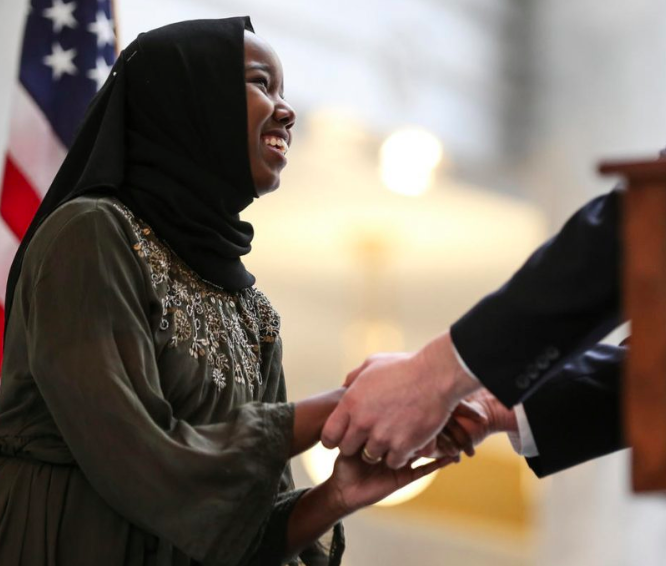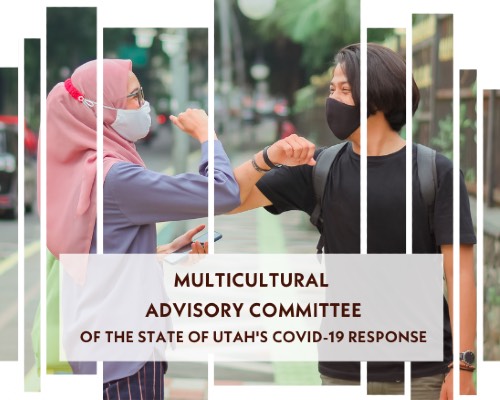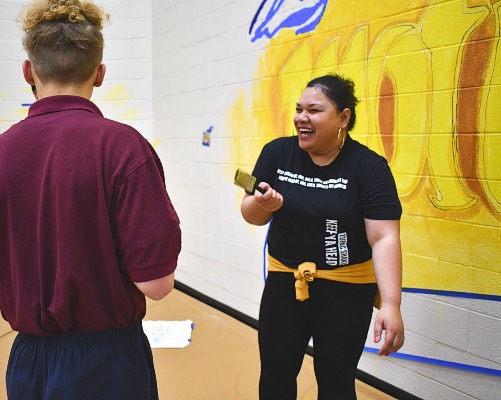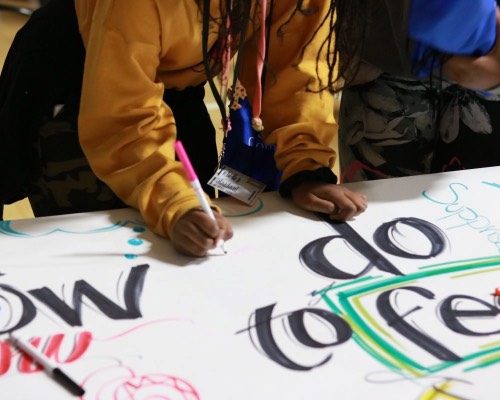ANNUAL REPORT
2020
Multicultural Affairs
Heritage & Arts Divisons

Lead with inclusion
Fiscal Year 2020 was a year of transition and growth at the Utah Division of Multicultural Affairs. Under the leadership of a new director, and as a team, Multicultural Affairs revisited their vision and mission, and considered how to better increase engagement with multicultural communities.
The division underwent significant rebranding and identified three foundational pillars to guide their program priorities, which include: Youth Leadership and Civic Engagement, Training Resources, and Community Outreach. During the past year the division has accomplished several successful efforts under each pillar.
Those priorities gained heightened significance in the last quarter of the fiscal year. The COVID-19 pandemic highlighted societal inequities for health care, emergency response, and communications to with non-English speakers. At nearly the same time, the killing of George Floyd in Minneapolis brought a reckoning with racial justice and inequality for the entire nation.
While the responses to these events would extend well into fiscal year 2021, the division was prepared because of their work in FY20.
MCA provided training opportunities to state agencies and community providers in hopes of increasing awareness of cultural considerations to better serve multicultural communities.
MCA developed three training sessions that focused on disrupting division through 1) Intentional Connection, 2) Active Bystander Engagement and 3) Understanding the Impact of Unconscious Bias. MCA engaged various community stakeholders interested in building the capacity of their equity, diversity, and inclusion programs across Utah’s broader society through community meetings, several conferences, division trainings and committee events.
In addition, MCA launched the #LeadWithInclusion Campaign on January 1, 2020, which encouraged stakeholders across Utah to commit to building inclusive, welcoming, and equitable workspaces. This campaign also served to expose people to our website’s self-guided learning tools and equity focused dictionary to create shared understanding around terminology.

Other highlights

CoVID-19 Response
On March 6th, 2020, Governor Gary Herbert declared a state of emergency in Utah due to the pandemic. In the face of such an unprecedented situation, there would be many social, cultural, and economic dimensions to this crisis. Unique barriers would exist for those most vulnerable, for those from the communities that have historically existed in the margins and continued to be forgotten in the face of this new and unfamiliar crisis.
Our division sought to establish a baseline of immediate needs and unique barriers faced by disenfranchised populations during the outbreak to better inform our state leaders of the growing gaps and to solve these concerns together. With the support of our Multicultural Commission, which is co-chaired by Lt. Governor Spencer Cox and Byron Russell, and the Martin Luther King Jr. Human Rights Commission, chaired by Ms. Emma Houston, our division prepared a survey for service providers and first responders working directly with vulnerable and systematically marginalized communities.
The qualitative data collected highlighted the lived experience of our underserved constituents and it allowed us to understand the complex and intersectional crisis that many people were enduring. The data was coded based on keywords, phrases, and ideas that emerged from each question and these codes allowed us to cluster the data based on commonalities and significant topics. In one week our team created the “Local Needs Among Multicultural Communities During the COVID-19 Pandemic” Report. One of the primary recommendations we made was to create a multicultural subcommittee that focused on the growing disparities in order to centralize and amplify the voices of those most often silenced.
Governor Herbert, appointed MCA to oversee the Multicultural Advisory Committee of Utah’s COVID-19 Response. This effort is co-chaired by Byron Russell and Ze Min Xiao, and Governor Herbert formally appointed 26 racially and ethnically diverse leaders that represent a cross-section of state agencies, nonprofits, faith-based organizations and community leaders.
The purpose of the Multicultural Advisory Committee is to work in collaboration with existing frameworks to amplify efforts and alleviate the growing disparities faced by marginalized and underrepresented communities. During the past 4 months the Committee has met every week as a large group and they have collaborated towards long and short-term goals that address the pre-existing challenges the pandemic has compounded for our most vulnerable communities. Without fail, these members have also met multiple times a week within their strategy workgroups and discussed ways to increase awareness, increase access, and increase services to the populations hardest hit by the pandemic. This group of dedicated volunteers have considered, discussed, explored and envisioned solutions that not only address the gaps that currently exist but that have the potential to change culture so that our historically underserved communities are equitably considered in relief and recovery efforts.
The 26 members appointed to the Advisory Committee have focused on closing service delivery gaps in food security, housing and social services, economic sustainability, communications, language accessibility, digital equity, and health access.
The Committee has established meaningful partnerships with state agencies, public and private partners, and community based organizations, in order to increase awareness of the need for equitable distribution of resources, access to personal protective equipment, and the creation of language accessible information through translation, interpretation, and literacy skills considerations. The communications strategy team has collaborated with state leaders in the coordination of disseminating culturally relevant information for mass access and has brought attention to the efforts of community advocates already engaged in critical grassroots initiatives.

Mural Project
MCA partnered with the Utah Division of Arts and Museums; along with the Salt Lake Valley Detention Center, Utah Board of Juvenile Justice, Utah Juvenile Justice Services, Utah Juvenile Defender Attorneys and Voices for Utah Children, to host an opportunity to explore healing through art expression for youth-in-custody. The mural art experience served as a way to promote restorative practices that highlight the positive impact youth can have in their surroundings, no matter how difficult the circumstances. Through trauma-informed guided exercises, incarcerated youth were encouraged to reflect on their own experiences and envision possibilities for an empowered life outside of detention.
The experience was led by a Pacific Islander graffiti artist—Tracy Williams—who facilitated discussions about hope and motivation with the youth. These conversations inspired them to create the artwork splashed across three walls with a bold message of “stay motivated” surrounded by multiple figures holding up the words to remind youth that a community was behind them hoping they succeed. The mural was shown to the public during a community unveiling where incarcerated youth described the impact of the project on their life. According to Kevin, he said “the project gave him a chance to do something positive, as well as a chance to reconnect with family members he’s been estranged from. One of the mural’s images, a strong fist, offered a reminder to Nathan of his commitment to break the cycle, ‘and not come back.’ Another artist, Dominique, added: ‘You’re all here right now,’ underscoring how the mural offered the chance to be noticed for something beyond the violence in his past.”

Youth Leadership
The Multicultural Youth Leadership Program strengthens and enhances the lives of the diverse youth MCA serves. This past year, the program engaged thousands of students and educators and empowered them with critical information provided through motivational speakers, panel discussions and interactive workshops sessions. The program strives to create a culturally appropriate, safe place for students from throughout Utah to meet one another, hear inspiring speeches from leaders that look like them, and access resources that address their educational needs.
MCA’s new partnership with Salt Lake Community College allowed the Division to host the 8th annual Multicultural Youth Leadership Summit at their Taylorsville campus. The high-paced and engaging day allowed more than 1,000 diverse students from 7th, 8th, and 9th grade to interact with colleges, organizations, and facilitators that provided an empowering educational experience for our emerging leaders. We reached our target audience with over 75% of our scholars identifying as racially and ethnically diverse and over 51% coming from Title I schools.
During the 2019 Summit, youth had the meaningful opportunity to explore a college campus, possibly for the first time. They were surrounded by a diverse student body that helped them recognize they had a place in higher education. Students and educators expressed great excitement over this year’s program and a large part of this was because it was hosted at a college facility.
Another meaningful partnership MCA cultivated this year was with the University of Utah S.J. Quinney College of Law. MCA collaborated with them during the 2020 Youth Leadership Day, which enabled the Division to increase attendance and create a bridge for access and resources to underrepresented youth. This welcoming and empowering space was made possible by the efforts of Dean Elizabeth Kronk Warner and the S.J. Quinney College of Law's commitment to encourage multicultural youth to see themselves in higher education. Youth were given a powerful and resounding message by Dean Kronk Warner that emphatically declared, “You belong.” That became a central theme throughout the experience, which influenced the way youth and educators engaged during the day. Breakout sessions, presented by Voices for Utah Children and UServeUtah, spoke to how students could be community advocates and get involved in public service.
MCA hosted a total of 352 racially and ethnically diverse 10th, 11th, and 12th grade students and educators from 27 different schools and institutions within 12 school districts throughout Utah. The original goal was 250 students and educators.
Performance Measures
The Division of Multicultural Affairs tracks performance measures based around participation in the annual youth leadership events.
Number of students attending youth leadership events annually. GOAL: 1,000
Number of schools represented at youth leadership events annually. GOAL: 53
Budget
Multicultural Affairs was established by Executive Order in 2012 to develop culturally diverse outreach programs for Utah’s multicultural community. It was codified as a division in 2019 by the Utah Legislature. The division recognizes the importance of developing relationships within Utah’s diverse ethnic communities to achieve its vision and mission. The state is experiencing a rapidly changing demographic and with this growth is the rich and traditional heritage of the ethnic population that Multicultural Affairs shares through community outreach.
